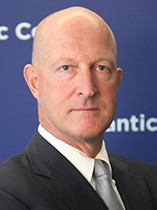Ian Brzezinski testifies to House Committee on Foreign Affairs on Russian bounties on US troops
Oral Statement by Ian J. Brzezinski
Senior Fellow, Atlantic Council
Russian Bounties on US Troops: Why Hasn’t the Administration Responded?
House Committee on Foreign Affairs
9 July 2020
Statement
Chairman Engel, Ranking Member McCaul, distinguished members of the Committee, Americans are rightly outraged by reports of Russia placing bounties on US military personnel in Afghanistan. These reports, as heinous as they are, underscore a broader challenge confronting the West: Russia’s pattern of escalating, aggressive international conduct.
Over the last decade and a half, Moscow has applied the full suite of Russian power to dominate its neighbors, create division in the West, and position Russia as a global power. Its suite of tools has included: military and para-military forces, economic and energy embargoes, assassination and political subterfuge, information and cyber-warfare, separatist groups, and frozen conflicts.
That campaign history includes: The 2007 cyber-attack on Estonia, the 2008 invasion of Georgia, the 2014 invasion of Ukraine, the 2016 coup attempt in Montenegro, assassinations in the United Kingdom, Germany, Austria and elsewhere
As the committee has documented, Russia has meddled not only in the elections of our allies and but even in our own elections.
This willingness to directly attack the United States took a kinetic dimension in Syria in 2018. There Russian para-military units attacked outposts known to be manned by US special operations forces.
In light of all this, recent reports of Russia’s bounties on American soldiers are disturbingly consistent with what has been a steady escalation of Russian international interference and aggression.
Calibrating the West’s Response
Over the past decade and a half the West’s response to Russia’s assertiveness has consisted of limited incremental escalations of economic sanctions and military deployments complemented by half-hearted and short lived diplomatic isolation.
This incrementalism conveys hesitancy and a lack of unity and determination on behalf of the United States and the Western Alliance. It has failed to convince Putin to reverse course. It may have actually emboldened him. Continued incrementalism not only promises continued confrontation with Russia, it increases the risk of conflict, both intentional and unintentional.
US strategy regarding Putin’s Russia needs to be calibrated to this reality. Properly calibrated engagement entails exploring avenues through which to modulate tension and foster collaboration.
It also requires more immediate and stronger measures to deter and counter Russian aggression and provocation. Toward those ends, US strategy should include the following priorities:
First, we need to increase NATO’s Readiness for High Intensity Conflict: Russia’s military modernization efforts and concentration of forces on its eastern frontier have increased the risk conflict in Europe.
This reality underscores the need for our NATO Allies to continue to increasing their military capability and readiness.
There is more the US can and should do. We should transition the US armored brigade combat team in Poland and related elements to a permanent presence. The US should also permanently station to the Baltics states a special forces element.
President Trump should also reconsider his decision to withdraw US forces from Germany. Removing forces from Europe weakens our deterrent posture in Europe. It signals a lack of commitment to European security that President Putin will surely relish.
Second we need to more robustly support the Transatlantic Aspirations of Georgia and Ukraine: NATO enlargement expanded the zone of peace and security in Europe and strengthened the Alliance’s military capability.
Both Ukraine and Georgia should be provided a clear path to NATO membership. Perpetuating their position in a zone of geopolitical ambiguity only animates President Putin’s sense of opportunity to reassert dominion over these two nations.
Third, we need more effectively counter Russia’s dissemination abroad of false and divisive information.
In this realm, the United States essentially disarmed itself in 1999 when it closed the doors of the United States Information Agency. This multi-billion-dollar agency was our frontline force on the information front.
Congress should establish a modernized version of USIA so that the United States can return to the offense in this dynamic and fast paced dimension of international affairs.
Fourth, we should increase economic Sanctions on Russia: Today’s sanctions may impair the Russian economy, but if their intended outcome has been to deter Russian aggression, they have failed by that measure.
Sanctions should be escalated from measures primarily aimed against specific Russian individuals and firms to more comprehensive sectoral sanctions against the Russian financial and energy sectors.
Finally we need to strengthen Western Cohesion and Unity: These aforementioned actions will only be fully effective if they are complemented by unity in purpose and action within the Transatlantic Community.
——–
Mr. Chairman, Ranking Member McCaul, as you and the committee address the intelligence regarding Russian bounties, I urge you to also assess the effectiveness of US policy in terms of deterring, countering, and containing the full spectrum of Moscow’s malign ambitions and actions.
When it comes to Russia, the time is long overdue for an unequivocal US policy.
Related experts
Related testimony

The Transatlantic Security Initiative, in the Scowcroft Center for Strategy and Security, shapes and influences the debate on the greatest security challenges facing the North Atlantic Alliance and its key partners.

